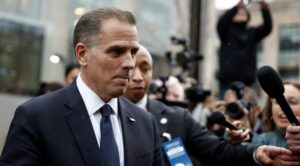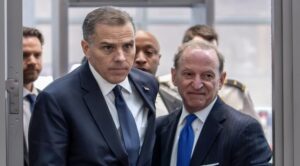Abbe Lowell argued on Wednesday that the tax allegations filed against Hunter Biden in the U.S. District Court for the Central District of California should be dismissed. Biden’s team of lawyers filed eight motions for dismissal.
Eight motions for dismissal were filed by the Defense and will be reviewed by US District Judge Mark Scarsi. They claim that the nine-count charge should be dismissed for:
- Hunter Biden is now immune to prosecution under the July 2023 Diversion Agreement
- The prosecution has violated the Appropriations clause and Special Counsel David Weiss’ appointment was illegal.
- Selective and vindictive prosecution and breach of separation of powers
- Due Process Violations based on outrageous Government Conduct
- Improper venue
- Lack of specificity and failure to state a claim
Judge Mark Scarsi told both parties that he would rule on the various petitions for dismissal by April 17,
Scarsi’s response was faster than expected. He issued an Order of 82 pages on Monday evening, which denied all eight motions for dismissal. The highlights are listed below.
Biden’s claim he is immune under the Diversion Agreement

Having found that the Diversion Agreement is a contract that binds the parties but that the parties made the Probation Officer’s signature a condition precedent to its performance, the Court turns to the Defendant’s theory of immunity: that the United States’ obligation to refrain from prosecuting Defendant under section II(15) of the Diversion Agreement is currently in force. (Immunity Mot. 19–20.) It is not. The immunity provision is not one exempted from the term of the contract under the survival clause. (See Diversion Agreement §§ II(1), (15).) Thus, the performance of the Government’s agreement not to prosecute the Defendant is not yet due.
The Court is aware that its decision is based on a contract interpretation neither party sought: the Diversion Agreement is legally binding, but its terms are not yet to be performed. The Court invites the parties, if there are any additional disputes arising from the Court’s Schrodinger-like construction of the Defendant’s immunity under the Diversion Agreement, to agree to further pretrial practice.
Regarding the claim that David Weiss, Special Counsel, was appointed illegally:
In his reply, the defendant concedes that SSSS 509, 510 515 and 533 may “authorize the AG to appoint a prosecution” but argues a “Special Counsel” is a “term of art created DOJ regulations.” This argument is a case of form preceding substance. According to Defendant, the Attorney-General could have designated Mr. Weiss as “Designated Counsel”, under the Attorney-General’s statutory authority. SSSS 6000.4-.10 and the problem that Defendant is complaining about would be resolved. The fact that the Attorney General chose to use the term “Special counsel” rather than another term that would have been indicative of an independent attorney is not a significant difference.
Biden’s claim, that the indictment was based on a selective and vindictive prosecution.

The defendant did not provide any evidence, as the Court said at the hearing. Notably, the motion does not include any declarations, exhibits, or requests for judicial notification. Defendant cites instead portions of Internet news sources and social media posts as well as legal blogs. These citations are not evidence.
The defendant offers no concrete evidence that animus motivated the prosecution in this case. His circumstantial claims of animus are very thin.
Technically, Defendant offered virtually no evidence to support his motion. Even if the Court credited the Defendant’s sources in support of his claim, his offer does not meet the rigorous standard needed to justify discovery.
Biden’s claims of Due Process Violations based on outrageous Government Conduct:
The defendant focuses his argument on Shapley and Ziegler’s influence on the prosecutor’s decision to pursue tax charges. (Outrageous Conduct Mot. 19 (insisting the agents “pressured the prosecution’s hand”).) Aside from failing to substantiate his allegations that the agents influenced the prosecutorial decision with anything but speculation, the Defendant offers no case in which a court exercised supervisory powers to dismiss an indictment due to conduct that impacts the fundamental decision to prosecute.
Scarsi is not impressed by the arguments of Biden’s lawyers. Hunter Biden’s federal tax case will continue. The trial date is currently June 20, 2024.










